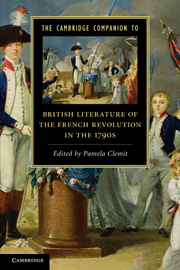Book contents
- Frontmatter
- 1 The Political Context
- 2 Burke, Reflections On The Revolution In France
- 3 Paine, rights Of Man
- 4 Burke And Paine: Contrasts
- 5 Wollstonecraft, vindications and historical And Moral View Of The French Revolution
- 6 Godwin, Political Justice
- 7 Wollstonecraft and Godwin: dialogues
- 8 Popular radical culture
- 9 Counter-revolutionary culture
- 10 Women’s voices
- 11 Novels of opinion
- 12 Revolutionary drama
- 13 Politics and poetry
- Guide to further reading
- Index
- The Cambridge Companions to...
13 - Politics and poetry
Published online by Cambridge University Press: 28 July 2011
- Frontmatter
- 1 The Political Context
- 2 Burke, Reflections On The Revolution In France
- 3 Paine, rights Of Man
- 4 Burke And Paine: Contrasts
- 5 Wollstonecraft, vindications and historical And Moral View Of The French Revolution
- 6 Godwin, Political Justice
- 7 Wollstonecraft and Godwin: dialogues
- 8 Popular radical culture
- 9 Counter-revolutionary culture
- 10 Women’s voices
- 11 Novels of opinion
- 12 Revolutionary drama
- 13 Politics and poetry
- Guide to further reading
- Index
- The Cambridge Companions to...
Summary
Poetry and the spirit of the age
In his essay ‘Mr Wordsworth’ in The Spirit of the Age (1825), the radical essayist William Hazlitt offers a polemical, tendentious and highly influential account of the relationship between the French Revolution and the work of one of the era's most important poets. Opening with a flourish, Hazlitt makes the historicist argument that ‘Mr Wordsworth's genius is a pure emanation of the Spirit of the Age’, proceeding to present the poet as a verse terrorist (in the 1790s sense of the word):
[His poetry] is one of the innovations of the time. It partakes of, and is carried along with, the revolutionary movement of our age: the political changes of the day were the model on which he formed and conducted his poetical experiments. His Muse (it cannot be denied, and without this we cannot explain its character at all) is a levelling one. It proceeds on a principle of equality, and strives to reduce all things to the same standard.
(WH Works, vol. xi, p. 87)Wordsworth, Hazlitt suggests, marches poetry to the guillotine with a Robespierrean ruthlessness, striving to rid it of its literary heritage and its generic hierarchies:
His popular, inartificial style gets rid (at a blow) of all the trappings of verse, of all the high places of poetry . . . The purple pall, the nodding plume of tragedy are exploded as mere pantomime and trick, to return to the simplicity of truth and nature. Kings, queens, priests, nobles, the altar and the throne, the distinctions of rank, birth, wealth, power, ‘the judge’s robe, the marshal’s truncheon, the ceremony that to great ones ’longs,’ are not to be found here. The author tramples on the pride of art with greater pride. The Ode and Epode, the Strophe and the Antistrophe, he laughs to scorn. The harp of Homer, the trump of Pindar and of Alcæus are still. The decencies of costume, the decorations of vanity are stripped off without mercy as barbarous, idle, and Gothic.
(p. 87)- Type
- Chapter
- Information
- Publisher: Cambridge University PressPrint publication year: 2011
- 2
- Cited by



